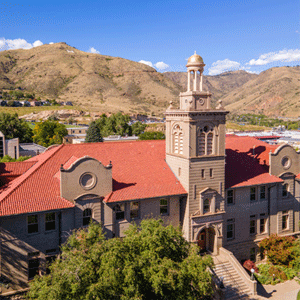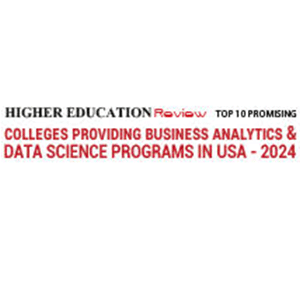Colorado School Of Mines: Shaping Minds To Be Tomorrow's Decision Architects
By Colorado School of Mines
Claimed to be the seedbed for analytical innovations, the United States of America has been witnessing an exponential surge in the demand for skilled data scientists and analysts. With the subsequent rise of data-oriented courses, the country has also emerged to be the abode of premier education, advanced research facilities, and commensurate career prospects, equipping students with skills to analyze data, churn out valuable insights, and drive strategic decisions for their dream organizations.
However, there are limited universities that are spearheading change through their distinctive pedagogy and courses that focus on not just the broader realm of data science and its mechanisms, but also all of the specialized domains that constitute the multifaceted field.
Among such trailblazers, Colorado School of Mines (Mines), a R1 public research university in Golden, Colorado, stands tall as a prominent institution. “Our contribution to nationwide training programs lies in our genuine collaboration between computer science and statistics. Unlike many programs that tend to focus more on specific aspects of data science, such as computer science, our program recognizes that true data science is an emerging field that seamlessly integrates the disciplines of computer science and statistics,” shares Douglas Nychka, a professor of applied mathematics and statistics at Mines.
Underpinned by 150 years of forging knowledge and innovation, Mines possesses a rich heritage of creating changemakers with science and engineering proficiency. Mines was established in 1874 with a focus on mining and metallurgy research and application against the backdrop of Colorado’s gold rush. Over time, the university underwent a steady transformation, expanding its curriculum to include geological sciences, civil engineering, mechanical engineering and more, ultimately evolving into a comprehensive STEM-based institution.
Renowned for its cutting-edge research initiatives, close industry partnerships, and vast alumni network, Mines specializes in an expansive range of traditional as well as in-demand technical domains, including data science and business analytics, in the undergraduate, graduate, and post-graduate spectrum. Meticulously crafted to engineer high-quality learning experiences, the integral part of its course offerings is formed by applied mathematics, statistics, and computer science, while a considerable portion consists of different elective courses that are designed to best fit individual professional goals.
A key hallmark of Mines is its objective to provide students with engaging, collaborative, and practical real-world experience, which is reflected in its academic model. “We have consistently maintained a focused approach with a student population of about 6,000. Our industry associations and our highly skilled faculty, most of whom come from industry, anchor our educational research and resources,” says Sam Spiegel, Assistant Vice President of online education.
While this combination helps the institution develop a relevant educational experience, the university’s medium size, according to Spiegel, allows it to be agile. This quick adaptability is exemplified in Mines’ online programs, which encompass the same portfolio of degree and certification programs available offline. In fact, there are full-time faculty who teach specialized courses every semester, such as machine learning, ensuring accessibility to students in various formats. Prioritizing an interactive learning environment in every class, Mines’ teaching and research faculty, regardless of their modes of instruction, meet the highest quality standards and undergo constant professional development trainings. Many of the professors are actively engaged in STEM-related research, which, in turn, keeps the curriculum up to date while upholding the foundational quality of Mines. Students benefit from well-equipped classrooms and labs while also using personal laptops to access advanced systems like Canvas to facilitate seamless digital teaching and information delivery. With these resources, Mines ensures students reap easy and equal accessibility to quality education.
Mines also strives to endow students with integrity and resilience to weather professional complexities through various 1-credit courses and initiatives like Innov8x. “Through Innov8x, our students handle projects of our local partners and companies, empowering them to apply a range of skills, including data science and other professional expertise as well as soft skills,” states Hua Wang, Computer Science Professor and Director of Mines’ data science program. Students are also encouraged to engage proactively in futuristic research projects by being a part of research centers like the national laboratory network in the U.S. The Computing-Mines Affiliates Partnership Program (C-MAPP) at Mines also provides numerous professional learning activities and events for computing students, along with research, scholarship, and internship opportunities. Mines’ annual career fair also offers commensurate career choices for graduate students, with opportunities from more than 400 notable companies every year. With such laudable learner-centric endeavors, Mines has multiple coveted recognitions, including high rankings in esteemed magazines like Money and Forbes. In alignment with its overarching mission to drive positive societal change, Mines continues to advance research and education in key areas related to material sciences, environmental engineering and energy solutions.
However, there are limited universities that are spearheading change through their distinctive pedagogy and courses that focus on not just the broader realm of data science and its mechanisms, but also all of the specialized domains that constitute the multifaceted field.
Among such trailblazers, Colorado School of Mines (Mines), a R1 public research university in Golden, Colorado, stands tall as a prominent institution. “Our contribution to nationwide training programs lies in our genuine collaboration between computer science and statistics. Unlike many programs that tend to focus more on specific aspects of data science, such as computer science, our program recognizes that true data science is an emerging field that seamlessly integrates the disciplines of computer science and statistics,” shares Douglas Nychka, a professor of applied mathematics and statistics at Mines.
A Legacy of Excellence
Underpinned by 150 years of forging knowledge and innovation, Mines possesses a rich heritage of creating changemakers with science and engineering proficiency. Mines was established in 1874 with a focus on mining and metallurgy research and application against the backdrop of Colorado’s gold rush. Over time, the university underwent a steady transformation, expanding its curriculum to include geological sciences, civil engineering, mechanical engineering and more, ultimately evolving into a comprehensive STEM-based institution.
Renowned for its cutting-edge research initiatives, close industry partnerships, and vast alumni network, Mines specializes in an expansive range of traditional as well as in-demand technical domains, including data science and business analytics, in the undergraduate, graduate, and post-graduate spectrum. Meticulously crafted to engineer high-quality learning experiences, the integral part of its course offerings is formed by applied mathematics, statistics, and computer science, while a considerable portion consists of different elective courses that are designed to best fit individual professional goals.
"Prioritizing an interactive learning environment in every class, Mines’ teaching & research faculty, regardless of their modes of instruction, meet the highest quality standards & undergo constant professional development trainings”
A key hallmark of Mines is its objective to provide students with engaging, collaborative, and practical real-world experience, which is reflected in its academic model. “We have consistently maintained a focused approach with a student population of about 6,000. Our industry associations and our highly skilled faculty, most of whom come from industry, anchor our educational research and resources,” says Sam Spiegel, Assistant Vice President of online education.
While this combination helps the institution develop a relevant educational experience, the university’s medium size, according to Spiegel, allows it to be agile. This quick adaptability is exemplified in Mines’ online programs, which encompass the same portfolio of degree and certification programs available offline. In fact, there are full-time faculty who teach specialized courses every semester, such as machine learning, ensuring accessibility to students in various formats. Prioritizing an interactive learning environment in every class, Mines’ teaching and research faculty, regardless of their modes of instruction, meet the highest quality standards and undergo constant professional development trainings. Many of the professors are actively engaged in STEM-related research, which, in turn, keeps the curriculum up to date while upholding the foundational quality of Mines. Students benefit from well-equipped classrooms and labs while also using personal laptops to access advanced systems like Canvas to facilitate seamless digital teaching and information delivery. With these resources, Mines ensures students reap easy and equal accessibility to quality education.
Creating Future-Ready Professionals
Mines also strives to endow students with integrity and resilience to weather professional complexities through various 1-credit courses and initiatives like Innov8x. “Through Innov8x, our students handle projects of our local partners and companies, empowering them to apply a range of skills, including data science and other professional expertise as well as soft skills,” states Hua Wang, Computer Science Professor and Director of Mines’ data science program. Students are also encouraged to engage proactively in futuristic research projects by being a part of research centers like the national laboratory network in the U.S. The Computing-Mines Affiliates Partnership Program (C-MAPP) at Mines also provides numerous professional learning activities and events for computing students, along with research, scholarship, and internship opportunities. Mines’ annual career fair also offers commensurate career choices for graduate students, with opportunities from more than 400 notable companies every year. With such laudable learner-centric endeavors, Mines has multiple coveted recognitions, including high rankings in esteemed magazines like Money and Forbes. In alignment with its overarching mission to drive positive societal change, Mines continues to advance research and education in key areas related to material sciences, environmental engineering and energy solutions.



